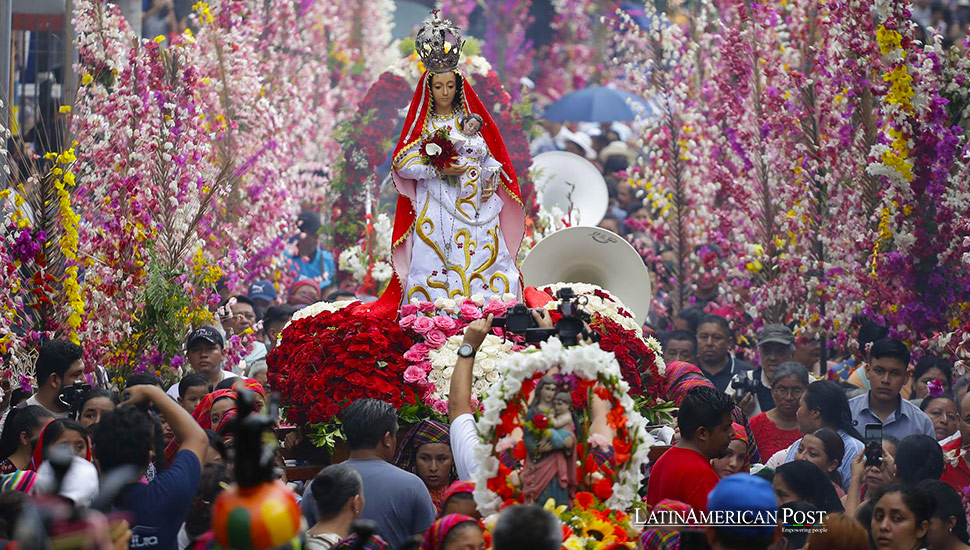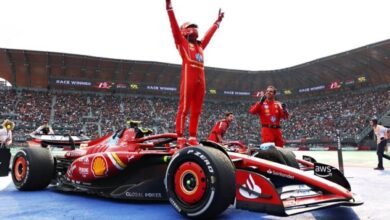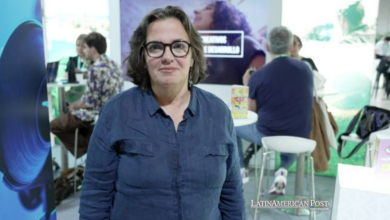Panchimalco’s Festival: Celebrating Rain and Virgin’s Feast

In Panchimalco, El Salvador, villagers revive indigenous and Christian traditions through the vibrant Festival of Flowers and Palms, honoring the rainy season and the Virgin of Conception amidst challenges.
In the heart of El Salvador, not far from the bustling capital, lies the quaint village of Panchimalco. Known for its rich indigenous heritage, this village transforms annually into a spectacle of color and spirituality during the Festival of Flowers and Palms. This event, deeply rooted in indigenous and Christian traditions, marks a dual celebration: the onset of the rainy season essential for their crops and the feast of the Virgin of Conception.
Celebrating Tradition and Community Spirit
On a bright Sunday morning, the air in Panchimalco is filled with a festive spirit as dozens of parishioners gather. They are here to participate in a procession that is both a spiritual observance and a vibrant community gathering. The participants, carrying religious images and intricately decorated palms adorned with fresh flowers, weave through the village streets. This tradition, passed down through generations, sees the community come together profoundly, expressing gratitude and faith.
The festival’s significance extends beyond its religious connotations; it is a lifeline for the agricultural community. Douglas Orellana, whose mother is one of the event’s organizers, shared with EFE how the festival represents one of the locals’ most significant times of the year. “This is the strongest festival in Panchimalco,” he remarked, emphasizing the community’s deep connection with their traditions.
However, this year’s celebration faced unexpected hurdles. The irregular onset of the rainy season made it challenging to source the flowers traditionally used to adorn the palms. These flowers, typically collected from various locations around the village, symbolize renewal and fertility, echoing the villagers’ reliance on the natural cycle of rain and growth.
A Fusion of Indigenous and Christian Elements
Despite these challenges, the festival also serves as a time of joyous reunion and culinary delight. Traditional dishes are prepared and shared, including “chicha,” a fermented beverage made from fruit, and panela, unrefined whole cane sugar. This drink, deeply embedded in the local culture, is a favorite among the festival-goers, linking them to their ancestral practices.
The festival is marked by the fusion of indigenous and Christian elements. This blend is evident in the religious and gastronomic practices and in the music that fills the air. Traditional bands play throughout the event, adding to the lively atmosphere that attracts not just locals but a growing number of domestic and international tourists. These visitors experience the unique cultural tapestry that Panchimalco weaves during this vibrant festival.
Recognizing its cultural significance and unique blend of traditions, the Ministry of Culture of El Salvador has designated the Festival of Flowers and Palms as an Intangible Cultural Heritage. This recognition is a nod to the festival’s historical and cultural importance and a protective measure, ensuring that these traditions are preserved for future generations.
Preserving Cultural Heritage
The festival’s impact stretches beyond the immediate celebrations. It plays a crucial role in promoting cultural tourism in El Salvador, providing a window into the rich cultural heritage of the country’s indigenous communities. For many tourists, it offers a rare glimpse into the blending of pagan and Christian traditions, an increasingly appealing aspect in a globalized world seeking authentic experiences.
Also read: Miami Hosts 25th Latin Grammy Awards Celebration
As Panchimalco continues to celebrate this age-old festival, it stands as a testament to the resilience and vibrancy of its people. Through challenges and changes, the community holds tight to its traditions, passing on the torch of its cultural identity to the younger generations. In this small Salvadoran village, the Festival of Flowers and Palms is more than just an annual event; it is a vital part of its cultural and spiritual fabric, celebrated with fervor and faith.




